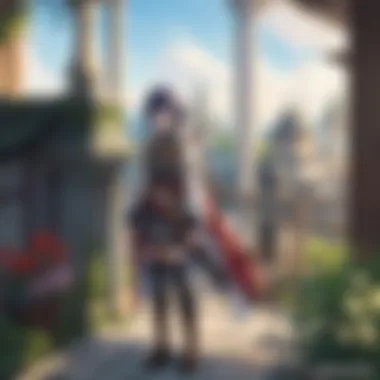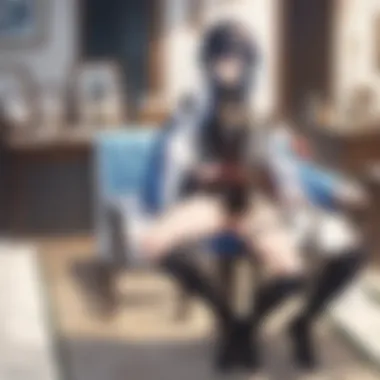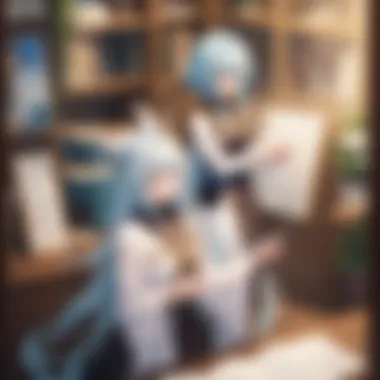Mushoku Tensei Season 2: Insights and Developments


Intro
Mushoku Tensei has made its mark in the anime world. Season 2 is not just a continuation but a significant evolution of the narrative. The anime, adapted from the light novel series by Rifujin na Magonote, has intrigued fans with its rich storytelling, complex characters, and intricate world-building. This article provides a detailed look at Season 2, its availability on Crunchyroll, character developments, and the broader implications within anime culture.
Featured Series or Manga
Overview of the Series
Mushoku Tensei is often hailed as a benchmark for the isekai genre. The story follows a jobless, hopeless man who reincarnates into a magical world as Rudeus Greyrat. With memories of his past life, he starts anew, aiming to make better choices. The narrative is not just about adventure; it tackles deep themes of redemption and personal growth. The animation quality, courtesy of Studio Bind, has drawn both praise and expectation. As the story progresses into its second season, viewers anticipate greater character depth and narrative complexity.
Key Characters and Development
Several key characters are pivotal in Season 2:
- Rudeus Greyrat: The protagonist facing challenges and growth.
- Sylphiette: A childhood friend who undergoes her own transformation.
- Ghislaine Dedoldia: A mentor figure with an interesting past.
- Eris Boreas Greyrat: A strong character with a fierce attitude.
As the season unfolds, expect these characters to experience significant evolution, revealing more about their motivations and relationships.
Character Analysis
Major Characters
Rudeus, in his new life, learns to navigate friendships, rivalries, and his own powers. His growth trajectory fascinates his audience. Sylphiette's character arc is notable as well; from a shy girl, she starts to embrace her abilities and confidence. Ghislaine and Eris provide a balance of strength and softness, both essential to Rudeus’s journey.
Character Arcs and Growth
Each main character's arc is intricately tied to the overarching themes of change and redemption. Rudeus, while battling his past mistakes, must navigate relationships that challenge him to be better. The interactions he has with Sylphiette are pivotal and reveal deeper layers of both characters. Ghislaine’s mentorship serves not only to guide Rudeus but also to depict the intricacies of personal growth.
Thematic Exploration
Main Themes and Messages
The core theme of Mushoku Tensei is the importance of second chances. Rudeus's journey symbolizes the potential for change in everyone, encouraging people to seek growth regardless of their past errors. Another theme highlights the importance of relationships, shaping individuals in profound ways.
Cultural Context and Influences
Mushoku Tensei’s success reflects trends within the anime community. The series explores themes resonating well with contemporary audiences. The representation of growth, renewal, and personal relationships is reflective of larger societal conversations occurring globally. The adaptation of this series emphasizes how anime can navigate complex discussions on identity and self-improvement.
"Mushoku Tensei serves as a reminder that one’s past does not determine their future, a message that resonates with many viewers today."
Ultimately, this exploration into Mushoku Tensei Season 2 provides valuable insights for both viewers and fans of anime. As the series continues, the anticipation grows, showcasing the narrative’s ability to resonate deeply with its audience. By examining character developments, themes, and cultural influences, one gains a richer understanding of its place in the anime landscape.
Preface to Mushoku Tensei
"Mushoku Tensei: Isekai Ittara Honki Dasu" is an important title in the modern anime landscape, and understanding its foundation is essential to appreciate the developments in Season 2. This series has not only redefined the isekai genre but has also influenced many aspects of storytelling in anime, creating a strong impression within its community. Through this section, we explore the key elements that contribute to its ongoing popularity and significance.
Overview of the Series
Mushoku Tensei tells the story of a disheartened man in his mid-thirties who finds a new life in a fantasy realm. After dying in an accident, he is reincarnated as Rudeus Greyrat, a child with extraordinary abilities. The series dives into themes such as redemption, growth, and the consequences of one's actions. It presents an intricate world filled with magic, adventure, and complex characters. The narrative is rich in detail, allowing viewers to engage with the story on various levels.
Initial Reception and Popularity


Upon its initial release, Mushoku Tensei received significant attention, translating into favorable reviews and a growing fanbase. Critics praised its thoughtful storytelling and intricate character development. Unlike many other anime in the isekai genre, Mushoku Tensei does not shy away from addressing mature themes. It presents a more realistic approach to its characters' growth, which resonated well with both casual viewers and seasoned fans.
- The series has garnered a high rating on various platforms, showcasing its quality and appeal.
- Discussions on forums like Reddit highlight the intricacies of the narrative, indicating that it sparked extensive analysis among viewers.
In summary, the introduction to Mushoku Tensei provides necessary context, enabling us to delve deeper into the subsequent developments of Season 2. Understanding its roots is crucial for appreciating its evolution, themes, and the way it stands out in a crowded genre.
Mushoku Tensei Season Details
Understanding the details surrounding Mushoku Tensei Season 2 is crucial for both fans and newcomers of the series. This season builds on the narrative established in its predecessor. It sets high expectations both from a storytelling and production standpoint. In this section, we will explore the anticipated release date and episode structure. These elements play a significant role in shaping audience perceptions and discussions.
Release Date and Expectations
The release date of an anime often dictates its level of hype and fan engagement. For Mushoku Tensei Season 2, anticipation has been building steadily. The date provides viewers with a sense of when they can dive into the next chapter of this complex narrative. Several platforms and forums, including discussions on Reddit and fan sites, have been buzzing with theories and hopes for Season 2.
Fans are especially eager to see how the story progresses after the first season's powerful conclusion. Many expect the series to maintain its high stakes and emotional depth, consistent with its previous installments. Furthermore, with announcements from the production team outlining improvements in animation and direction, expectations are higher than ever.
The release of a new season not only signifies a continuation of the story but also serves as a cultural event within anime communities.
Episode Count and Structure
The structure of the new season dictates how the story unfolds. Speculation has surrounded the episode count for Mushoku Tensei Season 2. The first season received praise for its pacing and character development across its episodes. Fans now wonder if the same format will be applied this time.
Historically, anime adaptations from light novels vary in length, influencing how closely they adhere to the source material. A concise number of episodes can lead to faster pacing, while a larger count allows for deeper exploration of themes and character arcs.
Content shown in trailers and teasers hints at significant plot points. This indicates that the producers will likely emphasize critical moments from the novels, balancing them with character-friendly episodes. This blend keeps the viewer captivated and allows for emotional engagement.
Crunchyroll and Streaming Dynamics
The role of streaming platforms in the modern consumption of anime cannot be overstated. Crunchyroll stands as one of the most significant players in this arena, particularly in relation to Mushoku Tensei Season 2. By examining how Crunchyroll operates, one can better appreciate its influence on the availability and distribution of anime. This section will explore the importance of Crunchyroll, focusing on both its impact on anime as a medium and its audience.
Role of Crunchyroll in Anime Distribution
Crunchyroll serves as a critical hub for anime distribution, especially for titles that gain traction like Mushoku Tensei. The platform offers simulcasts, enabling viewers to watch episodes shortly after their release in Japan. This feature not only fosters a global community of anime fans but also enhances the viewing experience with accessible subtitles. Crunchyroll's licensing agreements allow it to stream exclusive content, thus giving it a competitive edge in the marketplace.
The platform also provides a portfolio of diverse anime, appealing to various tastes. From mainstream hits to lesser-known gems, Crunchyroll caters to both casual viewers and hardcore fans. This broad selection plays a crucial role in promoting new series, creating a space where titles like Mushoku Tensei can thrive.
"Crunchyroll has changed the landscape of anime consumption, allowing viewers easier access than ever before."
Subscription Models and Accessibility
Crunchyroll operates multiple subscription models to cater to differing viewer needs. The primary tier, which is free, is supported by advertisements. While this is beneficial for those who wish to explore anime without committing financially, Mushoku Tensei may feature ads that interrupt the viewing experience.
Premium subscription options provide ad-free viewing, early access to episodes, and additional features. This can significantly enhance the experience for fans who want to keep up with Mushoku Tensei without interruptions. The tiered plans also offer options for family accounts, making it easier for multiple users to enjoy the platform.
In terms of accessibility, Crunchyroll is available on various devices including smartphones, tablets, and smart TVs. This flexibility allows fans to enjoy anime on their terms, whether at home or on the go. Overall, the diverse subscription models and wide accessibility contribute to Crunchyroll's importance in the anime community.
Narrative Developments in Season
The narrative developments in the second season of Mushoku Tensei continue to build on the intricate world the series has established. Understanding these developments is crucial for grasping the series' broader themes and character experiences. This section focuses on key plot points, the thematic framework, and the evolution of characters. These elements enrich the viewing experience and give fans much to discuss.
Key Plot Points and Themes
In this season, several significant plot points emerge. One primary focus is the exploration of personal growth through adversity. The protagonist, Rudeus Greyrat, faces complex dilemmas that challenge his previous beliefs. Throughout the new episodes, themes such as redemption, responsibility, and the consequences of one's actions are prominent. Each episode delves deeper into Rudeus's psyche, exploring his motivations and regrets. This layered storytelling reveals the depth of the characters and their struggles, catering to an audience that appreciates nuanced narratives.


Another essential theme revolves around the relationships Rudeus builds. Interactions with other characters showcase how they influence his journey. Whether through friendship, mentorship, or rivalry, these connections significantly impact his character growth. The dynamics between Rudeus and figures like Sylphiette and Eris are particularly noteworthy. Such developments create opportunities for viewers to reflect on their own relationships and growth beyond the fantasy setting.
"The series captivates with its ability to weave personal narrative threads into a grander storyline, demonstrating the interplay of individual and collective identities."
Character Arcs and Growth
The character arcs in this season are vital for the overall storyline. Rudeus's transformation is central. His journey from a socially awkward individual to a more confident and capable person illustrates the positive effects of change when faced with challenges. The internal and external conflicts he encounters mold his perspective. The audience observes moments where he falters, reinforcing the realism in his journey.
Additionally, supporting characters receive ample focus. For instance, Sylphiette's struggles with self-esteem and her desire for acceptance engage viewers emotionally. Similarly, Eris's character development highlights themes of independence and strength. Both characters evolve significantly, often paralleling Rudeus's growth while maintaining their unique identities. This interplay enriches the narrative and adds layers of complexity.
Animation Quality and Production Insights
Animation quality plays a critical role in the overall reception of anime series, particularly for works that are as richly detailed as Mushoku Tensei. The connection between high animation standards and viewer engagement cannot be underestimated. Quality animation can enhance storytelling, bringing emotional moments to life and accentuating the narrative's intricacies.
Additionally, production insights help audiences appreciate the behind-the-scenes elements that contribute to the viewing experience. Understanding the studios involved, the direction taken, and the technical execution can provide fans with a new lens through which to interpret the series. Good animation adds depth to character designs and world-building, which are essential in the isekai genre.
Studio and Direction
Mushoku Tensei is produced by Studio Bind, a notable name in the anime industry, having gained recognition for its effective storytelling and animation. The studio's commitment to excellence is evident in their previous works.
The directorial vision under YoshNeeded to focus on deep character emotions and vivid environments. Season 2 continues to push boundaries. A seasoned director ensures that character intentions and emotions are translated effectively on-screen. This requires not only technical skill but also a deep understanding of the source material. This is important for maintaining the series' integrity and following the original narrative closely.
"The animation of a series is not just about movement; it’s an emotional language facilitating the connection between the characters and the viewers."
Art Style and Technical Execution
Art style plays a key role in defining the look and feel of Mushoku Tensei. The series uses a mix of soft colors and detailed backgrounds, creating a vibrant atmosphere for its fantasy world. This artistic choice amplifies emotional scenes and emphasizes action sequences.
The technical execution involves animation techniques such as fluid movement, thoughtful pacing, and intricate background designs. CGI is seamlessly integrated without detracting from the hand-drawn aspects. These elements work in tandem to create immersive storytelling.
Overall, the animation quality and production insights into Mushoku Tensei not only reflect the technical skill involved but also connect deeply with audience perceptions. This dimension enriches viewer engagement and contributes to the series’ growing legacy.
Viewer Reception and Critical Response
In discussing Mushoku Tensei Season 2, understanding viewer reception and critical response is essential. This section gauges how the broader audience and critics perceived the new season. Such feedback informs current trends in the anime industry and offers valuable insights for creators and fans alike.
Critical Reviews and Scores
Critical reception for Mushoku Tensei Season 2 has been mixed to positive. Reputable sites like MyAnimeList and Anime News Network feature various ratings, reflecting a spectrum of opinions. Critics often highlight the show’s intricate character development and narrative depth. On review aggregator sites, scores typically range from 7 to 9 out of 10, indicating a generally favorable view among those assessing its artistic elements.
Among the specific points applauded are the writing quality and the pacing of the storyline. Many reviews note how well the show balances emotional depth with action, which is sometimes lacking in other anime titles in the isekai genre. Notably, the character growth, especially of Rudeus and his companions, has been celebrated as a strong aspect of the plot. The distinct departure from typical isekai tropes also received attention from critics, positioning the series as a more sophisticated narrative venture.
Fan Reactions and Discussions
Fan reactions on platforms like Reddit and Twitter provide a different perspective on Mushoku Tensei Season 2. Many viewers express their thoughts through community discussions, often analyzing themes, character dynamics, and animation quality. The fanbase is quite vocal, and forums regularly feature threads dissecting individual episodes.
Discussions around this season often reveal a deep appreciation for the show. Fans celebrate its thematic complexity and the challenges it poses to traditional ideals of morality and growth. Most discussions emphasize the following:
- Character Development: Fans appreciate how characters evolve, especially Rudeus, who faces many moral dilemmas.
- Production Values: The animation quality continues to impress, maintaining high expectations set by the first season.
- Complex Themes: The exploration of societal issues, such as redemption and personal responsibility, resonates with viewers, prompting extensive discussions.
In some cases, fan reactions can be sharply divided. Certain segments of the audience feel that pacing issues detract from moments of emotional resonance. Others argue these same moments enrich the narrative's depth. Ultimately, fan engagement showcases a dedicated community that greatly invests in the series's outcomes.


"The discussions around character arcs help define what makes Mushoku Tensei stand out in a crowded genre."
Viewer reception is crucial for identifying what resonates with the audience. Be it through critical reviews or passionate fan discussions, the reactions to Mushoku Tensei Season 2 provide a lens through which to observe its impact on the anime landscape.
Cultural Impact and Legacy
Themes Reflecting Real-World Issues
Mushoku Tensei explores numerous themes that resonate with audiences. At its core, the story delves into issues such as personal growth, social stigma, and redemption. The protagonist, Rudeus Greyrat, represents a flawed character striving for improvement. This theme of redemption appeals to many, making viewers reflect on their own lives and decisions.
The series also highlights the struggles of acceptance. Rudeus faces criticism for his past actions, embodying the challenge of overcoming societal judgments. This resonates deeply in today’s world, where individuals often face backlash for their mistakes. Overall, these themes create a narrative that is not just entertaining but thought-provoking, serving as a mirror to contemporary societal issues.
Influence on Future Anime Productions
Mushoku Tensei has left a notable mark on the anime industry and its approach to storytelling. Its unique blend of character development and fantasy elements has set a standard for other productions within the genre. Many upcoming isekai series often borrow narrative structures and character arcs first established by Mushoku Tensei.
The show's influence extends beyond mere imitation; it encourages new producers to incorporate deeper, more nuanced characters. This shift can lead to richer storytelling in future anime, appealing to audiences who desire depth rather than surface-level escapism.
As the anime genre evolves, the importance of compelling character development cannot be overstated.
Comparative Analysis with Other Isekai Titles
The exploration of Mushoku Tensei in the context of other isekai anime provides valuable insights into what sets this series apart. Isekai, meaning "another world", is a genre in anime and manga where characters are transported to or reborn in a different world. Analyzing Mushoku Tensei alongside other notable isekai titles reveals the execution of themes, character development, and narrative structure that both adhere to and deviate from common tropes.
Similarities and Differences
Mushoku Tensei shares thematic elements with other isekai series, particularly the idea of a second chance at life. Series such as Re:Zero - Starting Life in Another World and No Game No Life present leads who are thrust into unfamiliar worlds, yet the depth and complexity of characters in Mushoku Tensei often overshadow others.
- Themes of redemption: All three series explore the notion of redemption, but Mushoku Tensei delves deeper into the protagonist's past failures and the psychological growth that stems from them.
- Character focus: Whereas Re:Zero often showcases a wider range of supporting characters, Mushoku Tensei emphasizes the protagonist’s personal journey and intimate relationships.
- World-building: The richness of the world in Mushoku Tensei stands out. The intricate societal structures and magical systems create a backdrop that is both believable and engaging in a way that is sometimes lacking in other titles.
"By examining these aspects, viewers can appreciate how Mushoku Tensei brings fresh nuances to the isekai genre while maintaining familiar narrative mechanics."
Genre Evolution and Trends
The isekai genre has evolved significantly over the years, responding to audience preferences and cultural shifts. Mushoku Tensei plays an essential role in this evolution.
- Character-driven narratives: More recent isekai series tend to focus heavily on character exploration as opposed to purely action-driven plots. Mushoku Tensei exemplifies this shift, where emotional depth is as important as adventure.
- Complex moral themes: Unlike earlier titles that mostly centered on escapism, newer series, including Mushoku Tensei, tackle moral ambiguity, societal issues, and personal dilemmas. The protagonist's journey questions ethical implications in a fantasy setting.
- Increased realism: Even within fantastical contexts, there is a move towards a more realistic portrayal of characters and their growth. This trend is starkly evident in Mushoku Tensei, where the protagonist evolves through genuine struggles, making him relatable.
Familiarizing oneself with these aspects of Mushoku Tensei enhances the viewer's ability to appreciate the nuances of its storytelling. This understanding will also serve as a launchpad for discussing the show’s future impact on the genre.
The End: The Future of Mushoku Tensei
The prospect of future seasons of Mushoku Tensei carries a significant weight in terms of continuing narrative exploration and character development. With Season 2 now being well-received by both fans and critics alike, it raises questions about how the creators will navigate the increasingly intricate plot lines and the audience's expectations moving forward. The series holds much promise as it deepens its world-building and explores unique themes that resonate with many.
Looking Ahead to Future Seasons
As we look ahead, it is reasonable to anticipate that Mushoku Tensei will continue to expand its narrative horizons. Future seasons could delve further into character backstories, particularly those that were hinted at but not fully explored in the current season. Key figures like Rudeus and his companions hold the potential for profound growth, and their individual arcs may lead to fascinating developments.
Moreover, the complex themes of redemption and personal growth will likely remain central. Given the philosophical undertones present so far, Mushoku Tensei seems poised to challenge its audience with moral dilemmas and the consequences of choices that affects not just the protagonists but their surrounding worlds too. This direction promises a deeper engagement with the story's core message, which can captivate both new viewers and long-time fans.
As the anime continues to adapt the light novels, fans anticipate seeing faithful representations of the source material, while hoping for insightful deviations that enrich the narrative. The expectations are high not just for alignment with the original but also for creative input that can elevate the animated version to an even higher level.
Final Thoughts on Its Impact
Reflecting on the impact of Mushoku Tensei, one can see how it has carved a niche for itself in the anime landscape. Its approach to storytelling and character development has renewed conversations around the value of flawed characters in a fantasy setting. The series has managed to tread a fine line between fantasy escapism and serious, relatable themes. As a result, it stands as a significant contributor to ongoing discussions about the isekai genre's evolution.
The anime's success may spark influences on future productions, where creators examine deeper emotional narratives instead of relying solely on action-driven plots. Such influences could lead to an enriching period for anime as a whole, ultimately attracting a broader audience that engages with storytelling on multiple levels.
"Mushoku Tensei sets a new standard for character-driven narratives within the isekai genre."



